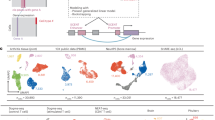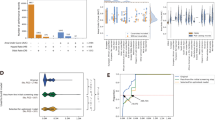Abstract
We have previously reported multiple loci associated with prostate cancer susceptibility in a Japanese population using a genome-wide association study (GWAS). To identify additional prostate cancer susceptibility loci, we genotyped nine SNPs that were nominally associated with prostate cancer (P < 1 × 10−4) in our previous GWAS in three independent studies of prostate cancer in Japanese men (2,557 individuals with prostate cancer (cases) and 3,003 controls). In a meta-analysis of our previous GWAS and the replication studies, which included a total of 7,141 prostate cancer cases and 11,804 controls from a single ancestry group, three new loci reached genome-wide significance on chromosomes 11q12 (rs1938781; P = 1.10 × 10−10; FAM111A-FAM111B), 10q26 (rs2252004; P = 1.98 × 10−8) and 3p11.2 (rs2055109; P = 3.94 × 10−8). We also found suggestive evidence of association at a previously reported prostate cancer susceptibility locus at 2p11 (rs2028898; P = 1.08 × 10−7). The identification of three new susceptibility loci should provide additional insight into the pathogenesis of prostate cancer and emphasizes the importance of conducting GWAS in diverse populations.
This is a preview of subscription content, access via your institution
Access options
Subscribe to this journal
Receive 12 print issues and online access
$209.00 per year
only $17.42 per issue
Buy this article
- Purchase on Springer Link
- Instant access to full article PDF
Prices may be subject to local taxes which are calculated during checkout


Similar content being viewed by others
References
Amundadottir, L.T. et al. A common variant associated with prostate cancer in European and African populations. Nat. Genet. 38, 652–658 (2006).
Eeles, R.A. et al. Multiple newly identified loci associated with prostate cancer susceptibility. Nat. Genet. 40, 316–321 (2008).
Eeles, R.A. et al. Identification of seven new prostate cancer susceptibility loci through a genome-wide association study. Nat. Genet. 41, 1116–1121 (2009).
Gudmundsson, J. et al. Common sequence variants on 2p15 and Xp11.22 confer susceptibility to prostate cancer. Nat. Genet. 40, 281–283 (2008).
Gudmundsson, J. et al. Genome-wide association and replication studies identify four variants associated with prostate cancer susceptibility. Nat. Genet. 41, 1122–1126 (2009).
Yeager, M. et al. Identification of a new prostate cancer susceptibility locus on chromosome 8q24. Nat. Genet. 41, 1055–1057 (2009).
Thomas, G. et al. Multiple loci identified in a genome-wide association study of prostate cancer. Nat. Genet. 40, 310–315 (2008).
Kote-Jarai, Z. et al. Seven prostate cancer susceptibility loci identified by a multi-stage genome-wide association study. Nat. Genet. 43, 785–791 (2011).
Takata, R. et al. Genome-wide association study identifies five new susceptibility loci for prostate cancer in the Japanese population. Nat. Genet. 42, 751–754 (2010).
Haiman, C.A. et al. Genome-wide association study of prostate cancer in men of African ancestry identifies a susceptibility locus at 17q21. Nat. Genet. 43, 570–573 (2011).
Yamada, H. et al. Replication of prostate cancer risk loci in a Japanese case-control association study. J. Natl. Cancer Inst. 101, 1330–1336 (2009).
Dickson, S.P., Wang, K., Krantz, I., Hakonarson, H. & Goldstein, D.B. Rare variants create synthetic genome-wide associations. PLoS Biol. 8, e1000294 (2010).
Chernova, O.B. et al. A novel member of the WD-repeat gene family, WDR11, maps to the 10q26 region and is disrupted by a chromosome translocation in human glioblastoma cells. Oncogene 20, 5378–5392 (2001).
Clayton, R.N. et al. Tumour suppressor genes in the pathogenesis of human pituitary tumours. Horm. Res. 47, 185–193 (1997).
Ittmann, M. Allelic loss on chromosome 10 in prostate adenocarcinoma. Cancer Res. 56, 2143–2147 (1996).
Katoh, M. FGFR2 and WDR11 are neighboring oncogene and tumor suppressor gene on human chromosome 10q26. Int. J. Oncol. 22, 1155–1159 (2003).
Katoh, M. Recombination cluster around FGFR2-WDR11-HTPAPL locus on human chromosome 10q26. Int. J. Mol. Med. 11, 579–583 (2003).
Mendoza, S., David, H., Gaylord, G.M. & Miller, C.W. Allelic loss at 10q26 in osteosarcoma in the region of the BUB3 and FGFR2 genes. Cancer Genet. Cytogenet. 158, 142–147 (2005).
Gudmundsson, J. et al. Genetic correction of PSA values using sequence variants associated with PSA levels. Sci. Transl. Med. 2, 62ra92 (2010).
Lange, E.M. et al. Early onset prostate cancer has a significant genetic component. Prostate 72, 147–156 (2011).
Ben-Batalla, I. et al. Deregulation of the Pit-1 transcription factor in human breast cancer cells promotes tumor growth and metastasis. J. Clin. Invest. 120, 4289–4302 (2010).
Berkner, K.L. The vitamin K–dependent carboxylase. Annu. Rev. Nutr. 25, 127–149 (2005).
Ohnishi, Y. et al. A high-throughput SNP typing system for genome-wide association studies. J. Hum. Genet. 46, 471–477 (2001).
Li, Y., Willer, C.J., Ding, J., Scheet, P. & Abecasis, G.R. MaCH: using sequence and genotype data to estimate haplotypes and unobserved genotypes. Genet. Epidemiol. 34, 816–834 (2010).
Stranger, B.E. et al. Population genomics of human gene expression. Nat. Genet. 39, 1217–1224 (2007).
Akamatsu, S. et al. A functional variant in NKX3.1 associated with prostate cancer susceptibility down-regulates NKX3.1 expression. Hum. Mol. Genet. 19, 4265–4272 (2010).
Mutucumarana, V.P. et al. Expression and characterization of the naturally occurring mutation L394R in human γ-glutamyl carboxylase. J. Biol. Chem. 275, 32572–32577 (2000).
Brenner, B. et al. A missense mutation in γ-glutamyl carboxylase gene causes combined deficiency of all vitamin K–dependent blood coagulation factors. Blood 92, 4554–4559 (1998).
Acknowledgements
We thank the staff of the Laboratory for Genotyping Development at the Center for Genomic Medicine at RIKEN for their contribution to SNP genotyping, and K. Nakano and K. Watanabe for their technical assistance. We also thank Y. Mitobe and M. Kishida for sample management and clinical data collection. We are grateful to the members of the BioBank Japan Project and the Rotary Club of Osaka-Midosuji District 2660 Rotary International in Japan for supporting our study. This work was conducted as a part of the BioBank Japan Project that was supported by the Ministry of Education, Culture, Sports, Sciences and Technology of the Japanese government and was supported in part by a research grant from the Japan Society for the Promotion of Science (22390306 to H.N.), by the Princess Takamatsu Cancer Research Fund and by the Takeda Science Foundation. The Multiethnic Cohort (MEC) was supported by grants from the US National Institutes of Health (NIH; HG004726, CA148537, CA54281 and CA63464). S.A. is a Japan Society for the Promotion of Science Research Fellow.
Author information
Authors and Affiliations
Contributions
S.A., R.T., T.I., Y.N. and H.N. designed the study. S.A., R.T., C.A.H., M.K., G.K.C., L.L.M., L.N.K., T.K., Y.Y., M.Y., H.T., H.Y., S.E., T.F., B.E.H., T.H., O.O., Y.N. and H.N. contributed to sample collection, genotyping and data management. A.T. and N.K. contributed to the statistical analysis. S.A., C.A.H. and H.N. wrote the manuscript. M.F. performed immunohistochemistry, and S.A. performed functional experiments. S.A. and H.N. summarized the results. Y.N., O.O., T.F., J.I. and H.N. obtained funding for the study.
Corresponding author
Ethics declarations
Competing interests
The authors declare no competing financial interests.
Supplementary information
Supplementary Text and Figures
Supplementary Figures 1–10 and Supplementary Tables 1–4 (PDF 1367 kb)
Rights and permissions
About this article
Cite this article
Akamatsu, S., Takata, R., Haiman, C. et al. Common variants at 11q12, 10q26 and 3p11.2 are associated with prostate cancer susceptibility in Japanese. Nat Genet 44, 426–429 (2012). https://doi.org/10.1038/ng.1104
Received:
Accepted:
Published:
Issue Date:
DOI: https://doi.org/10.1038/ng.1104
This article is cited by
-
Association of genetic variants with prostate cancer in Africa: a concise review
Egyptian Journal of Medical Human Genetics (2021)
-
Epidemiology and genomics of prostate cancer in Asian men
Nature Reviews Urology (2021)
-
Genetic Testing in Prostate Cancer
Current Oncology Reports (2020)
-
African KhoeSan ancestry linked to high-risk prostate cancer
BMC Medical Genomics (2019)
-
Genetic causes of hypomagnesemia, a clinical overview
Pediatric Nephrology (2017)



